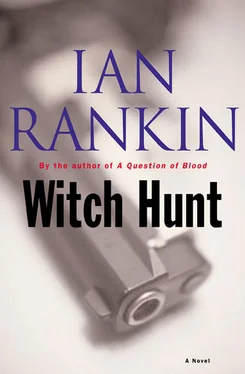“How can you be sure?”
“I can’t. So instead of reading the file, you can question me. I’ll answer anything. That way, whatever isn’t touched upon isn’t touched upon. It stays secret. Agreed?”
Elder shrugged. “It seems a long-winded way of —”
“Agreed?”
“Agreed,” he said. Barclay and Dominique were paying attention now, their own problems forgotten. Dominique burst in with the first question.
“Is the Home Secretary suspected of being a double agent?”
Joyce Parry smiled. “No,” she said.
“I think you’re on the wrong track,” Elder told Dominique gently. “What we have here is something altogether more... personal.” He turned to Parry. The idea, growing in his mind these past hours, was monstrous, almost unthinkable. Yet it had to be tested. “Did Jonathan Barker have an affair with his secretary?”
“Which secretary?”
“Marion Rose.”
Joyce Parry nodded. “That’s my understanding.”
“This was before his first wife died?”
“Yes.”
“Long before she died?”
“Probably, yes. A number of years.”
Elder nodded thoughtfully. Doyle had known something about it, had heard some rumor. Hence his nickname for Barker. “Did his wife know?”
“I shouldn’t think so. She wasn’t the type to keep that sort of knowledge to herself.”
Now Barclay interrupted. “There’s no suspicion surrounding her death?”
“No, the postmortem was meticulous. She died from natural causes.”
“To wit?”
“Lung cancer. She was a heavy smoker.”
“Yes,” said Elder, “so I seem to remember. What about Barker during this time?”
“What time?”
“The time he was having an affair with Marion Rose. How was his career shaping up?”
“Pretty well. He wasn’t quite in politics then, of course. But he was in the running for a candidacy. He got it, won the seat, and that was him into parliament.”
“At quite a young age.”
“Twenty-nine.”
“Yes, twenty-nine. No children by the first marriage?”
“No.”
“Did the first marriage have its problems then?”
“Not that we know of. Apart from the glaring fact that Barker was having at least one affair.”
“This was his second marriage — Marion’s first?”
“That’s right.”
“A quiet woman?”
“Yes, until recently. I mean, her profile increased.”
“Mmm, the image-men got their hands on her. Charitable good works and so on, but unassuming with it... the model MP’s wife.”
“I suppose you could say that.”
“He didn’t get into parliament at the first attempt, did he?”
“No.”
“Why not?”
“Because he lost.”
“Yes, but why did he lose?”
A shrug. “Swing to the —”
“But why, Joyce?”
She paused, swallowed. “There was a rumor he was a bit of a ladies’ man. A localized rumor, but it put enough voters off.”
“But by the second by-election?”
“He was cleaner than clean.”
“And has been since?”
“Yes.”
“And he’s risen and risen.”
“Not exactly meteoric, though.”
“No, slow, meticulous, I agree with you there. And there’ve been no scandals?”
“Not in parliament, no.”
“But outside parliament?”
“Just the one you referred to, and that was never public.”
“What? His fling with Marion? Mmm, wouldn’t have gone down well, though, would it? Wouldn’t go down well even now, even as ancient history — MP sleeping with secretary while wife’s dying of cancer. Bit of a black mark. He was a millionaire?”
“By the time he was twenty-one.”
“Father’s money?”
“Mostly, yes, but he put it to good use.”
“A wise investor.”
“A chain of record shops, actually, just in time to clean up on the Beatles and the Stones.”
“Like I say, a wise investor.” Elder rubbed at his forehead. “To get back to his affair with Marion, what do we know about it?”
“You tell me.”
“All right,” said Elder, “I will. What happened to the child?”
“Child?”
“There was a child, wasn’t there?”
Joyce Parry looked down at the desk. “We don’t know for sure.”
“No? But there were ‘localized rumors,’ yes?”
“Yes.”
“Dear me, a pregnant secretary, a wife dying of cancer, and he’s put himself forward as a constituency candidate. Maybe for the second and potentially the last time. I mean, the last time if he didn’t win.” Elder tutted and turned to Barclay. “What would you do, Michael?”
Barclay started at the mention of his name, then thought for a second. “If I was a millionaire... pay off the secretary. She could go and look after the kid in secret, a monthly allowance or something.”
“Mmm... what about you, Miss Herault?”
“Me?” Dominique looked startled. “Oh, I don’t know. I suppose I would perhaps persuade my lover to abort.”
Elder nodded. “Yes, that’s probably what I’d do. What about you, Joyce?”
“An abortion, yes, if she’d agree to it.”
“Ah...” Elder raised his index finger. “If she’d agree to it. What if she wouldn’t?”
“Tell her it’s finished between us?” suggested Barclay.
“That would break her heart, Michael,” said Elder. “She loves you. She’d do anything but leave you. It would turn her against you if you spurned her. She might go to anybody with her story, the papers, the TV, anybody.”
“Then we’re back to square one,” said Joyce Parry.
“If she loves this man,” said Dominique, “surely she will agree eventually to the termination, no?”
“Yes,” said Elder. “Yes, she’d agree all right. The question is: would she go through with it?”
Dominique gave a big shrug. “We cannot ask her, she is dead... isn’t she?”
“Oh yes, she’s dead all right.”
“Then who can we ask? I do not understand.”
“It’s not as though we’ve got a crystal ball,” said Barclay.
“Michael,” said Elder, turning to him and slapping a hand down onto his knee, “but that’s precisely what we have got. And that’s exactly what we’ll use...”
With Trilling’s blessing, Greenleaf took a breather long enough for him to visit Doyle in hospital. Doyle’s head had been bandaged, and his face was bruised. He was awake but kept his eyes tightly shut for most of the short visit and complained of a thumping headache. A nurse had warned Greenleaf of this, and he had been told not to spend too long “with your friend.”
Walking towards the bed, Greenleaf wondered about that word “friend.” Were Doyle and he friends? Certainly they were closer than they had been a scant fortnight before. They worked well enough together, but that was only because they were so utterly different in outlook and temperament. The shortcomings of each were made up by the other.
The hospital was hectic. Victoria Street victims, being treated for cuts and shock. In some operating theater, they were working on what remained of Traynor’s leg. But Doyle’s ward was quiet enough. He was lying with his head propped on a single white pillow. They’d changed him out of his suit and into regulation pajamas, thick cotton with vertical stripes the color of uncooked liver. The nurse had asked Greenleaf what they should do with Mr. Doyle’s handgun. Greenleaf carried it with him now, inside a rolled-up white carrier. Doyle’s shoulder holster was in there, too.
Greenleaf still hadn’t handed in his own gun. Somehow he was getting used to it, nestling beneath his jacket there.
“Hello, Doyle.” He dragged a chair over to the bedside. The cabinet was empty save for a jug of water and a plastic cup. Greenleaf placed the carrier beside the water jug. Doyle opened his eyes long enough to watch this happening.
Читать дальше












